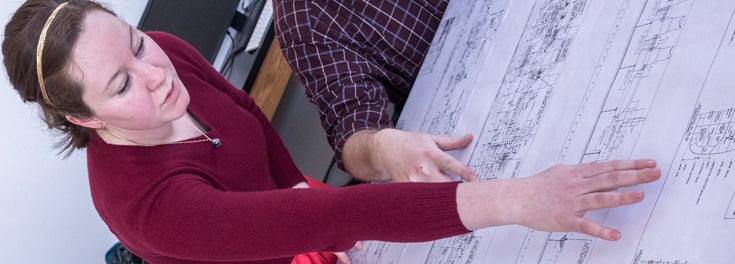Graduate student Alanna Casey loves to piece together historical puzzles. In the Applied History Lab, she interprets texts and artifacts from the past, using them to address modern problems.
She and other undergraduate and graduate students work with two of the leading practitioners of the emerging discipline of applied history, History Professors Rod Mather and John Jensen, who use the knowledge and wisdom of the past to help identify and address present-day policy changes.
“Applied history as we practice it at URI addresses contemporary issues by developing a thorough understanding of unique historic and cultural landscapes,” said Professor Mather. “When we go to a place, our job is to understand the local setting and the way human beings have lived there. If we can trace the history of human interactions with a particular place, we can help figure out appropriate options for the future.”
If we can trace the history of human interactions with a particular place, we can help figure out appropriate options for the future.
Alanna is spending most of her time studying a site off the coast of Virginia where a fleet of World War I German warships were sunk in an aerial bombardment that eventually led to the formation of the U.S. Air Force. She is examining the biological, physical, and archaeological characteristics of the offshore site that includes very deep canyons as well as shallow shelf areas.
Students and faculty in the Applied History Lab are also studying historic shipwrecks in Rhode Island and how they may be threatened by proposed offshore wind farms. And they are using a National Park Service contract to broaden the understanding of National Historic Parks on the East Coast, including George Washington’s birthplace in Virginia, St. Croix Island in Maine, and the Cape Cod National Seashore. At Washington’s birthplace, for instance, they found that the historic interpretation of the site since the 1930s ignored the nearby waterways, which were vital elements in Washington’s family’s selection and use of the property.
Professors Mather and Jensen say that the Applied History Lab is providing students with unique opportunities to work at the intersection of the arts, humanities, and sciences. Alanna agrees. She also says there is a great sense of community and collaboration among the students and professors in the lab. “They’ve all provided great advice and support for my ongoing research, and through my project I’ve gained real-world experience in the applications of history,” she said. “I even got to go on an offshore research cruise!”

